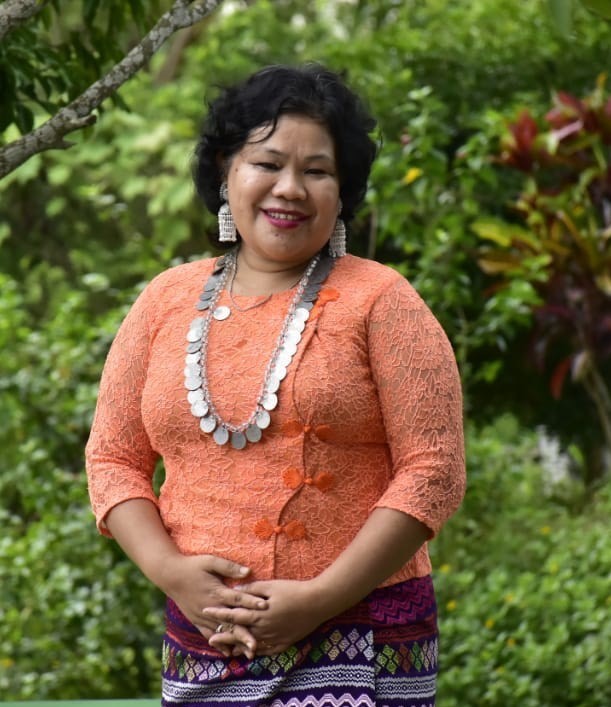
Chanchana is a founding member and current Member Secretary of the Bangladesh Indigenous Women’s Network (BIWN), which was created in 2012 and aims to promote and protect the human rights of, and protest and prevent violence against, Indigenous women and girls in Bangladesh. The organisation also helps to implement the Chittagong Hill Tracts Peace Accord, which was agreed with the government in 1997, to attempt to recognise the rights of the Indigenous communities in the Chittagong Hill Tracts (CHT).
Chanchana belongs to the Chakma community of Bangladesh, which is the largest Indigenous community in Bangladesh’s CHT. She moved to India because of the genocide inflicted against Indigenous people in the CHT, and some of her own family members were killed at this time by settler Bengalis. After moving back to Bangladesh and discovering the injustices against her community in their struggle for self-determination, Chanchana was motivated to work to protect the human rights of Indigenous people in Bangladesh. When her father asked her why she was so passionate to support the rights of Bangladesh’s Indigenous people even though Chanchana had grown up in India, Chanchana simply replied that “I have to taste what is bitter or sour or sweet. If I can eat, I will do”.
Chanchana says that the Diplomacy Training Program in 2012 was life changing for her. She made many new friendships with people around the world but also learned many new skills. For example, Chanchana did not know how to connect with advocates internationally or how to take photos and videos to help her activism prior to taking part in the training program, and she particularly enjoyed the field visits she went on in Timor-Leste to connect with the local community. After taking her learnings back to Bangladesh and sharing her experiences with her colleagues and community, they decided it was important to focus on human rights work related to Indigenous women in Bangladesh. That was when the BIWN was formed.
The BIWN is a civil society organisation and its mission has a number of elements to it. The organisation is working to encourage the social, economic, political and cultural participation of Indigenous women and girls in Bangladesh, as well as discourage gender-based discrimination on a national level. The BIWN also works to create a national network of Indigenous women and girls in Bangladesh and support responsible partnerships between this network and other communities across Bangladesh. Different community members and organisations are welcome to join. They also work in partnership with the Asia Indigenous People’s Pact. The BIWN is currently focused on advocating for increased education and health resources for Indigenous women and they are also trying to establish victims’ counselling and support centres in Bangladesh.
Chanchana says that the organisation still faces a lot of challenges in their work. Tourism and multinational corporations are direct threats to Indigenous land in the CHT. Chanchana says that Indigenous people believe that “land is our life”. The loss of land not only endangers this spiritual connection with the land, but it also leaves Indigenous families economically vulnerable. This is when women’s rights are especially threatened, because without any alternatives, many young girls are forced into prostitution, for example, to provide an income for their families. Throughout the current COVID situation, Indigenous women are also struggling to reach hospitals to access COVID tests.
However, Chanchana is very hopeful about the future of her organisation. She hopes that they can continue to find support in other communities and individuals for their work in lobbying the government and other stakeholders. For example, BIWN is working to make various demands of the government, including the formation of a land commission, the creation of an Indigenous parliamentary caucus, increased Indigenous women in parliament, and the recognition of Indigenous people in Bangladesh’s Constitution.
Chanchana also hopes that one day, the Diplomacy Training Program will be able to come to Bangladesh and arrange a program particularly focused on advocacy for Indigenous women.
DTP acknowledges the traditional custodians of the land on which we work, the Bedegal people of the Eora Nation. We recognise their lands were never ceded, and we acknowledge their struggles for recognition and rights and pay our respects to the Elders – past, present – and the youth who are working towards a brighter tomorrow. This continent always was and always will be Aboriginal land.
Aboriginal and Torres Strait Islander peoples should be aware that this website contains images or names of people who have passed away.
DTP acknowledges the traditional custodians of the land on which we work, the Bedegal people of the Eora Nation. We recognise their lands were never ceded, and we acknowledge their struggles for recognition and rights and pay our respects to the Elders – past, present – and the youth who are working towards a brighter tomorrow. This continent always was and always will be Aboriginal land.
Aboriginal and Torres Strait Islander peoples should be aware that this website contains images or names of people who have passed away.
Privacy Policy | Terms of Use | Disclaimer | Policies
© 2022 Diplomacy Training Program | ABN 31 003 925 148 | Web Design by Studio Clvr